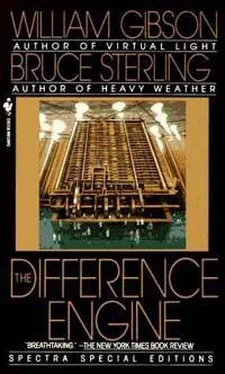William Gibson - The Difference Engine
Здесь есть возможность читать онлайн «William Gibson - The Difference Engine» весь текст электронной книги совершенно бесплатно (целиком полную версию без сокращений). В некоторых случаях можно слушать аудио, скачать через торрент в формате fb2 и присутствует краткое содержание. Жанр: sf_cyber_punk, fantasy_alt_hist, на английском языке. Описание произведения, (предисловие) а так же отзывы посетителей доступны на портале библиотеки ЛибКат.
- Название:The Difference Engine
- Автор:
- Жанр:
- Год:неизвестен
- ISBN:нет данных
- Рейтинг книги:3 / 5. Голосов: 1
-
Избранное:Добавить в избранное
- Отзывы:
-
Ваша оценка:
- 60
- 1
- 2
- 3
- 4
- 5
The Difference Engine: краткое содержание, описание и аннотация
Предлагаем к чтению аннотацию, описание, краткое содержание или предисловие (зависит от того, что написал сам автор книги «The Difference Engine»). Если вы не нашли необходимую информацию о книге — напишите в комментариях, мы постараемся отыскать её.
The Difference Engine — читать онлайн бесплатно полную книгу (весь текст) целиком
Ниже представлен текст книги, разбитый по страницам. Система сохранения места последней прочитанной страницы, позволяет с удобством читать онлайн бесплатно книгу «The Difference Engine», без необходимости каждый раз заново искать на чём Вы остановились. Поставьте закладку, и сможете в любой момент перейти на страницу, на которой закончили чтение.
Интервал:
Закладка:
"Do you know I've fifty-five miles' gear-yardage under me, still fouled from the Stink? Aside from the fact that your request is rather more than usually irregular…"
" 'Usually irregular'? That's rather good… "
"And your friends from the Special Branch trooping in hourly, demanding that our brass be spun and spun again, in hope of shaking loose these Luddites alleged to be lodged in the nation's rafters! Who is this bloody man, Oliphant?"
"A rather junior Rad politician, I understand. Or was, till the Stink and the resulting disorders."
"Till Byron's death, rather."
"But we've Lord Brunel now, haven't we?"
"Indeed, and bloody madness under him in Parliament!"
Oliphant let the silence lengthen. "If you could obtain the text of the telegram, Andrew," he said at last, very quietly, "I should be very grateful."
"He's a very ambitious man, Oliphant. With ambitious friends."
"You are not alone in that assessment."
Wakefield sighed. "Under the circumstances, extreme discretion—"
"By all means!"
"Aside from which our yardage is filthy. Condensed particulate matter. We're working the mechanics on triple-shifts, and having some success with Lord Colgate's aerosol applications, but I sometimes despair of ever having the system properly up and spinning!" He lowered his voice. "Do you know that the finer functions of the Napoleon have been unreliable for months?"
"The Emperor?" Oliphant pretended to misunderstand.
"The Napoleon's gear-yardage, in equivalent terms, is very nearly double ours," Wakefield said. "And it simply isn't functioning!" The thought seemed to fill him with a special horror.
"Had a Stink of their own, have they?"
Wakefield grimly shook his head.
"There you are, then," said Oliphant, "most likely the gears are jammed on a bit of onion-skin… "
Wakefield snorted.
"Do find me that telegram? At your earliest convenience, of course."
Wakefield inclined his head, but only very slightly.
"Good fellow," Oliphant declared. He saluted the Under-Secretary with his furled umbrella and rose, to retrace his steps through Q C's cubbies and the bowed and patient heads of Wakefield's clerks.
Oliphant had made his professionally circuitous way to Dean Street from the Soho tavern where he had instructed Betteredge to deposit him. Now he entered a soot-streaked house, its door unlatched. Latching it carefully behind him, he climbed two flights of uncarpeted stairs. The chill air smelled of cooked cabbage and stale tobacco.
He rapped twice at a door, then twice again.
"Come in, come in, you'll let in the cold… " The heavily bearded Mr. Hermann Kriege, late of the New York Volks Tribune, appeared to be wearing every article of clothing he possessed, as though he had wagered that he could all at once don the entire contents of a ragman's barrow.
He locked and chained the door behind Oliphant.
Kriege had two rooms, the one with the view of the street being the drawing-room, and behind it a bedroom. Everything broken and tattered, and in the greatest disorder. A large, old-fashioned table, covered with wax-cloth, stood in the middle of the drawing-room. On it lay manuscripts, books, newspapers, a doll with a Dresden head, bits and pieces of a woman's sewing things, chipped teacups, dirty spoons, pens, knives, candlesticks, an inkpot. Dutch clay pipes, tobacco-ash.
"Sit, sit, please." More ursine than ever in his bundled attire, Kriege waved vaguely toward a chair with only three legs. Blinking through a haze of coal– and tobacco-smoke, Oliphant made out a chair that seemed whole, though Kriege's daughter had been playing kitchen on it. Choosing to risk a pair of trousers, Oliphant swept jammy crumbs aside and sat, facing Kriege across the sad domestic litter of the crowded table-top.
"A small gift for your little Traudl," Oliphant said, taking a tissue-wrapped parcel from his coat. The tissue was secured with a self-adhesive rectangle, embossed with the initials of an Oxford Street toy-emporium. "A doll's tea things." He placed the parcel on the table.
"She calls you 'Uncle Larry.' She shouldn't know your name."
"Many's the Larry about Soho, I should imagine." Oliphant produced a plain envelope, unsealed, and placed it beside the parcel, precisely aligned with the table's edge. It contained three well-circulated five-pound notes.
Kriege said nothing. A silence lengthened.
"The Manhattan Women's Red Pantomime Troupe," Oliphant said at last.
Kriege snorted derisively. "The Bowery's Sapphic best, come to London? I remember them in Purdy's National. They wooed and won the Dead Rabbits to the cause, whose sole previous involvement with politics had consisted of rock-fights and punch-ups in municipal elections. The butcher-boys, the bootblacks, the prostitutes of Chatham Square and the Five Points, that was their audience. Sweaty proletarians, come to see a woman shot out of a gun, flattened against a wall, and peeled off like paper… I tell you, sir, your interest is misplaced."
Oliphant sighed. "My friend, it is my job to ask questions. You must understand that I cannot tell you my reasons for asking a given question. I know that you have suffered. I know that you suffer now, in exile." Oliphant glanced meaningfully about the tragic room.
"What then do you wish to know?"
"It has been suggested that among the various criminal elements, active during the recent civil disruptions, were agents of Manhattan." Oliphant waited.
"I find that unlikely."
"On what basis, Mr. Kriege?"
"To my knowledge, the Commune has no interest in disturbing the British status-quo. Your Rads have shown themselves to be benevolent bystanders, with regard to America's class-struggle. Indeed, your nation has behaved as an ally of sorts." There was much bitterness in Kriege's tone, a curdled cynicism. "One imagines it was in Britain's own interest to see the Northern Union lose its greatest city to the Communards."
Oliphant shifted cautiously on the uncomfortable chair. "You knew Mr. Marx intimately, I believe." In order to extract a given piece of information from Kriege, he knew, it was necessary to engage the man's dominant passion.
"Knew him? I was there to greet him off the boat. He embraced me, and not a minute later had borrowed twenty gold dollars, to pay his rent in the Bronx!" Kriege assayed a sort of laugh, strangled with abiding rage. "He'd his Jenny with him, then, though the marriage didn't survive the revolution… But he'd a Brooklyn Irish factory-girl in his bed when he expelled me from the Commune, sir, for preaching 'religionism and free-love'! Free-love indeed!" Kriege's large pale hands, with their unkept nails, plucked abstractedly at a sheaf of papers.
"You have been badly used, Mr. Kriege." Oliphant thought of his friend. Lord Engels; it did seem extraordinary, that the brilliant textile-manufacturer should involve himself, however distantly, with people of this sort. Kriege had been a member of the Commune's so-called "Central Committee," before Marx had sent him packing. With a price on his head in the Northern Union, he had sailed in steerage from Boston, penniless, under an assumed name, with his wife and child, to join London's thousands of American refugees.
"These Bowery pantomimes…"
"Yes?" Oliphant leaned forward.
"There are factions within the Party…"
"Do go on."
"Anarchists disguising themselves as communists; feminists, all manner of incorrect ideologies, you see, covert cells not under Manhattan's control…"
"I see," Oliphant said, thinking of the reams of yellow fan-fold representing the confession of William Collins.
Again on foot, Oliphant made his roundabout way through Soho, to Compton Street, where he paused before the entrance of a public house known as the Blue Boar.
Читать дальшеИнтервал:
Закладка:
Похожие книги на «The Difference Engine»
Представляем Вашему вниманию похожие книги на «The Difference Engine» списком для выбора. Мы отобрали схожую по названию и смыслу литературу в надежде предоставить читателям больше вариантов отыскать новые, интересные, ещё непрочитанные произведения.
Обсуждение, отзывы о книге «The Difference Engine» и просто собственные мнения читателей. Оставьте ваши комментарии, напишите, что Вы думаете о произведении, его смысле или главных героях. Укажите что конкретно понравилось, а что нет, и почему Вы так считаете.









